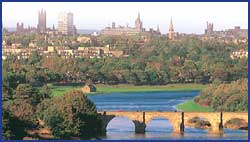 Experts Convene On Uncertainties Of Global Water Resources
Experts Convene On Uncertainties Of Global Water Resources
This week, in Bonn, Germany – world experts are convening on the dangers posed to Earth’s most vital resource:water.
“The list of human activities and their impact on the water systems of Planet Earth is long and important,” saidAnik Bhaduri, Executive Officer of the Global Water System Project (GWSP). “We have altered the Earth’s climatology and chemistry, its snow cover, permafrost, sea and glacial ice extent and ocean volume—all fundamental elements of the hydrological cycle.”
“We have accelerated major processes like erosion, applied massive quantities of nitrogen that leaks from soil to ground and surface waters and, sometimes, literally siphoned all water from rivers, emptying them for human uses before they reach the ocean,” he continued. “We have diverted vast amounts of freshwater to harness fossil energy, dammed major waterways, and destroyed aquatic ecosystems.”
To raise awareness and inform the debate surrounding man’s effect on the Earth, climate experts at the GWSP conference are embracing the term ‘Anthropocene’ as a label for the epoch that heralded human dominance of the planet with the retreat of the glaciers 11,500 years ago.
“The idea of the Anthropocene underscores the point that human activities and their impacts have global significance for the future of all living species — ours included,” Bhaduri said. “Humans are changing the character of the world water system in significant ways with inadequate knowledge of the system and the consequences of changes being imposed.”
“From a research position, human-water interactions must be viewed as a continuum and a coupled system, requiring interdisciplinary inquiry like that which has characterized the GWSP since its inception,” he added.
In a statement, the GWSP cited a recent study co-authored by University of Colorado water systems expert James Syvitski as a reference guide for humanity’s impact on the global water supply.
In the report, the authors note that an area the size of South America is used to grow the world’s crops and an area the size of Africa is used for raising its livestock. They also indict human activities as the main cause of river floods in developing countries that have killed thousands of people.
According to GWSP co-chair Claudia Pahl-Wostl, global water problems go beyond addressing simple needs like drinking water and sanitation issues.
“Human water security is often achieved in the short term at the expense of the environment with harmful long-term implications,” she said. “The problems are largely caused by governance failure and a lack of systemic thinking in both developed and developing countries.”
“By throwing concrete, pipes, pumps, and chemicals at our water problems, to the tune of a half-trillion dollars a year, we’ve produced a technological curtain separating clean water flowing from our pipes and the highly-stressed natural waters that sit in the background,” said Charles Vörösmarty, a civil engineering professor at The City College of New York (CCNY) and a founding member of the GWSP. “We treat symptoms of environmental abuse rather than underlying causes. Thus, problems continue to mount in the background, yet the public is largely unaware of this reality or its growing costs.”
With 60 special topic sessions, “Water in the Anthropocene” is a capstone event for the global conference. One of the stated goals at the GWSP meeting is to cobble together research for the scientific foundations of a common vision of Earth’s water future.
The project is expected to recommended priorities for policy makers with respect to water resources governance and management.
| Contact information | n/a |
|---|---|
| News type | Inbrief |
| File link |
http://www.redorbit.com/news/science/1112851559/water-resources-focus-global-meeting-experts-052013/ |
| Source of information | Brett Smith for redOrbit.com |
| Keyword(s) | Environment, Biodiversity, Anthropocene, Soft matter, Matter, Water, GWSP, Drinking water, Water resources, Hyperlink, Holocene |
| Subject(s) | ANALYSIS AND TESTS , CHARACTERISTICAL PARAMETERS OF WATERS AND SLUDGES , DRINKING WATER , DRINKING WATER AND SANITATION : COMMON PROCESSES OF PURIFICATION AND TREATMENT , HEALTH - HYGIENE - PATHOGENIC MICROORGANISM , HYDRAULICS - HYDROLOGY , INDUSTRY , INFORMATION - COMPUTER SCIENCES , INFRASTRUCTURES , MEASUREMENTS AND INSTRUMENTATION , METHTODOLOGY - STATISTICS - DECISION AID , RISKS AND CLIMATOLOGY , TOOL TERMS , WATER DEMAND , WATER QUALITY |
| Geographical coverage | Germany |
| News date | 22/05/2013 |
| Working language(s) | ENGLISH |
 you are not logged in
you are not logged in





